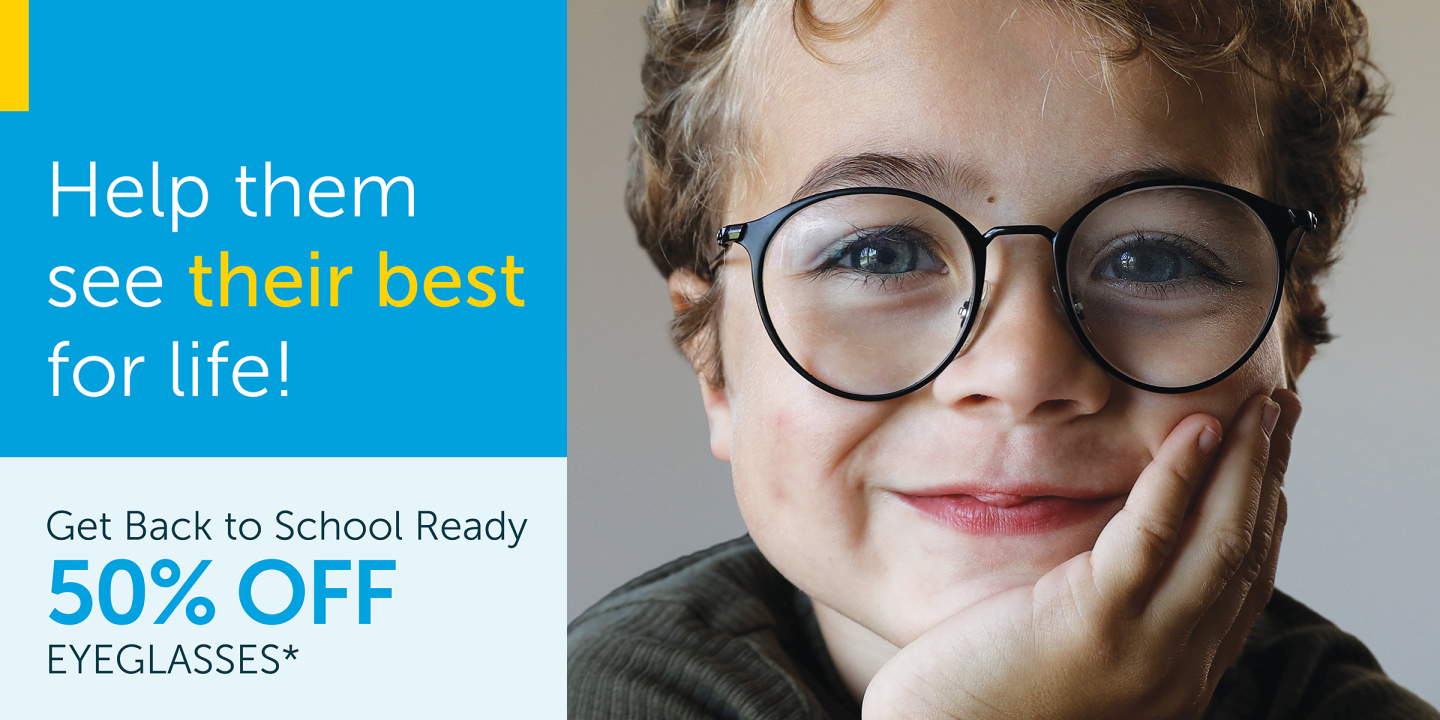Buy One, Get One 50% OFF Eyeglasses
* Restrictions apply. Ask a Team Member for details.
Protect Your Eyes with Effective UV Eye Protection - Why It Matters

Our eyes are one of the most essential parts of our bodies. We use our eyes so much that we often forget how delicate they are.
There are several ways we can cause damage to our eyes. One of the most common is exposure to too much ultraviolet (UV) radiation. Whether on a sunny day on vacation, a casual stroll in the park, or being outside during a gray and overcast day, UV rays can still reach your eyes and pose potential risks.
With July being UV safety awareness month, the team at Clarkson Eyecare wanted to spread awareness about harmful UV exposure and why you need UV eye protection. We want to ensure you are responsible for your eye health, especially as you spend more time outside this summer!
What is UV Radiation?
UV radiation is a type of electromagnetic radiation that comes from the sun. There are three types of UV rays—UVA, UVB, and UVC—but only UVA and UVB rays reach the Earth’s surface. Both UVA and UVB rays can have damaging effects on our eyes if we don’t take precautions. It is important to note that UV rays can help produce Vitamin D, essential to human health.
Overexposure to UV radiation can also cause sunburns, leading to serious health issues like cancer. It’s essential to protect your eyes and your skin!
Effect of UV Rays on Your Eyes
Extended and unprotected exposure to UV rays can lead to many eye-related health problems. Here are some of the conditions:
Cataracts
Prolonged exposure to UV rays can speed up the development of cataracts. Cataracts are a clouding of the lens inside the eye. They can impair vision and, if left untreated, may lead to blindness. If you take too long to seek treatment, you will likely need surgery to remove the cataracts.
Macular Degeneration
UV radiation brings an increased risk of age-related macular degeneration (AMD). AMD affects the central part of the retina, leading to blurry or distorted vision and, in severe cases, blindness and irreversible vision loss. AMD is a widespread eye condition. It is a leading cause of vision loss in people 50 or older. Protecting your eyes can reduce the rate at which you develop macular degeneration.
Photokeratitis
Photokeratitis is when your eye gets sunburned. It can be excruciating and occurs after intense exposure to UV rays. Symptoms of photokeratitis can include eye redness, excessive watering and tearing, blurred vision, and an uncomfortable sensation in the eyes. Photokeratitis is usually temporary, but too many occurrences can cause long-term damage. It goes to show how immediately UV rays can damage our eyes.
Pterygia
UV exposure has been associated with the development of a pterygium. A Pterygium is a growth of tissue on the white of the eye. Pterygium can cause discomfort, redness, and even astigmatism if it grows large enough to interfere with vision.
Eye Protection is Important
Now that you know what conditions can develop from too much exposure to UV rays, it’s essential to know why you need proper UV eye protection.
UV Exposure is Cumulative
It’s important to understand that the damage caused by UV radiation is cumulative over your lifetime. Protecting your eyes from a young age can significantly reduce the risk of developing eye problems later in life. Any children in your life must protect their eyes when they’re outside!
UV Protection is Needed Year Round
UV rays are present year-round, even on cloudy days or when you don’t see the sun. It’s essential to wear sunglasses with proper UV protection regularly, no matter the weather conditions or the season.
How to Choose the Best Sunglasses for UV Protection
When selecting sunglasses for UV eye protection, you must buy something that properly protects you and blocks UV rays. Buying sunglasses is not a situation where you should skimp on quality. There are many factors to consider:
UV Blocking
Look for sunglasses that provide 100% UV protection or 100% of UVA and UVB rays. These sunglasses should be clearly labeled as such. Many of the cheaper options you find at convenience stores don’t provide proper UV ray protection.
High-Quality Lenses
Ensure the lenses are high quality and provide clear vision and protection against harmful rays. You certainly don’t want lenses that make it difficult for you to see. Not only do you need to be protected, but you also want to ensure you stay safe by ensuring your vision isn’t negatively altered.
Coverage and Fit
Look for sunglasses that wrap around your face or have large enough lenses to maximize coverage and minimize UV exposure from the sides. You’ll want to ensure at least that the sunglasses fully cover your eyes. You also want to make sure that your sunglasses fit properly. If they are too loose, they can fall off or provide an opening for the sun. If your sunglasses are too small, they can cause discomfort and not provide enough coverage.
Polarized Lenses
Polarized lenses help reduce glare and provide added visual clarity, especially when driving. They are also extra helpful when the sun is at its brightest, and the level of UV rays is high.
Contact Clarkson Eyecare Today
If you haven’t been protecting your eyes from UV radiation, now is the time to start. Especially if you spend a lot of time outdoors, Clarkson Eyecare can find the perfect pair of sunglasses so you can start improving your eye health in no time.
Our expert team is dedicated to ensuring your sunglasses meet your needs and fit perfectly. You won’t get that treatment everywhere. We have locations in 11 states, including Missouri, Illinois, Ohio, Kentucky, Michigan, Minnesota, Texas, New Jersey, Virginia, Georgia, and Florida. No matter where you are, quality eye care and clearer vision are never far away! Call or click today for more information about how sunglasses can provide good UV eye protection. Reach out to schedule an appointment at Clarkson Eyecare! Check out our online sunglasses shop to look at your frame and lens options.
